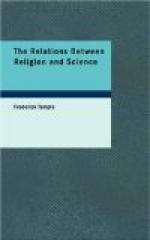All the higher religions have claimed to rest on a divine revelation, and the Christian Religion on a series of such revelations. The Christian Religion does not profess (as does for instance the Mahommedan) to be wrapped up in one divine communication made to one man and admitting thereafter of no modifications. Though resting on divine revelation it is professedly a development, and is thus in harmony with the Creator’s operations in nature. Whether we consider what is taught concerning the heavenly Moral Law, or concerning human nature and its moral and spiritual needs, or concerning Almighty God and His dealings with us His creatures, it is undeniable that the teaching of the Bible is quite different at the end from what it is at the beginning.
The New Testament considered by itself as a body of teaching is such an advance on all that preceded it as to be quite unique in the history of the world. The ideas conveyed in the Old Testament are absorbed, transformed, completed, so as to make them as a whole entirely new; and to these are added entirely new ideas sufficient by themselves to form a whole system of doctrine. And because of this it is difficult to speak of the new teaching as having grown out of the old.
But the Old Testament covers many centuries, and within its range we can trace a steady growth, and that growth always of the same character, and always pointing towards what the Gospel finally revealed. The strength of the moral sentiment in the earlier books is always assigned to the belief in, and reverence for, Almighty God. It is evidently held to be more important to believe in God and to fear Him than to see the perfection of His holiness. If we distinguish between Religion and Morality, Religion is made the more important of the two. It is more important to recognise that the holy God exists and reigns than to see clearly in what His holiness, and indeed all holiness, consists. The sentiment of reverence is more important than the perception of that universality which we now know to be the essential characteristic of the Moral Law. In analysing




